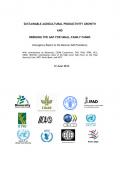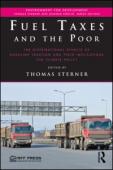The importance of cities in climate policy stems from the simple reality that they house the majority of the world's population, two-thirds of world energy use and over 70% of global energy use emissions. At the international level, global carbon markets have become an important new source of financing for mitigation projects and programmes. Yet to date, the participation of urban authorities and of urban mitigation projects in the global carbon market remains extremely limited. The under-representation of urban carbon projects can be linked both to the difficulties to implement urban mitigation projects and to the difficulties for cities to access the carbon market.
In less than a decade, clean energy transitioned from novelty products to the mainstream of world energy markets. The sector emerged not so much in a linear fashion as episodic – in fits and starts associated with the worldwide economic downturn, continent-wide debt crises, national policy uncertainty, and intense industry competition. Through it all, however, the clean energy sector moved inexorably forward, with overall investment in 2012 five times greater than it was in 2004.
Although 2012 investment levels worldwide declined 11 per cent, to US$ 269 billion, the clean energy sector weathered the withdrawal of priority incentives and initiatives offered by governments in numerous key markets, demonstrating its resilience. Reliable clean energy investment data have been collected for nine years now. Looking at the data in three-year increments, average clean energy investment increased by at least US$ 90 billion triennially – from an average of US$ 64 billion in the 2004-06 period to an average of US$ 156 billion in 2007-09 and US$ 245 billion in 2010-12.
This report aims at providing the emerging lessons from a representative sample of case studies in 20 developing countries that could help policy makers to address implementation challenges, including overcoming political economy and affordability constraints. The sample has selected on the basis of a number of criteria, including the country's level of development (and consumption), developing country region, energy security and the fuel it subsidies (petroleum fuel, electricity, natural gas).

Early in 2012 Mexico, as G20 President, invited international organisations to examine practical actions that could be undertaken to sustainably improve agricultural productivity growth, in particular on small family farms. The preparation of this report, co-ordinated by the FAO and the OECD, is a collaborative undertaking by Bioversity, CGIAR Consortium, FAO, IFAD, IFPRI, IICA, OECD, UNCTAD, Coordination team of UN High Level Task Force on the Food Security Crisis, WFP, World Bank, and WTO. The recommendations provided are broadly of two types: specific actions that can contribute in some way to improving productivity growth or sustainable resource use (whether building on existing initiatives or suggesting new activities) and more general proposals that may not be actionable as presented but that serve to highlight areas for priority attention.

This book challenges the conventional wisdom that gasoline taxation, an important and much-debated instrument of climate policy, has a disproportionately detrimental effect on poor people. Increased fuel taxes carry the potential to mitigate carbon emissions, reduce congestion, and improve local urban environment. As such, higher gasoline taxes could prove to be a fundamental part of any climate action plan. However, they have been resisted by powerful lobbies that have persuaded people that increased fuel taxation would be regressive. Reporting on examples of over two dozen countries, this book sets out to empirically investigate this claim. The authors conclude that while there may be some slight regressivity in some high-income countries, as a general rule, fuel taxation is a progressive policy particularly in low income countries. Rich countries can correct for regressivity by cutting back on other taxes that adversely affect poor people, or by spending more money on services for the poor. Meanwhile, in low-income countries, poor people spend a very small share of their money on fuel for transport.
